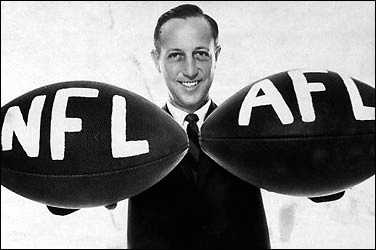(Article changed on January 20, 2013 at 22:08)
NFL Commissioner Pete Rozelle
By Diane M. Grassi
It has now been well documented throughout both the sports
world and the business world, that the National Football League (NFL) has
enjoyed unprecedented growth in revenue as a professional sports league, and
most notably in the past decade.
And as the NFL approaches a $10 billion annual take, its
largely billionaire team owners have grown quite accustomed to such returns
becoming routine and continuing infinitum.
But a wave of lawsuits against the NFL, well publicized in
the past many months, may not only put a crimp in future revenue for the NFL,
but also in how the rules of the game could ultimately be revised.
This reporter's original intent, for this article, was to follow-up on the piece written in February 2009, entitled NFL & Retirees Remain in Tussle On Benefits, by Diane M. Grassi, regarding the status of the disability benefits of NFL retirees prior to 1993.
But the issue of neurocognitive disorders and the NFL's
liability has since then surfaced with a vengeance, and cannot be ignored. And
as the result of chronic blows to the head, possible brain injuries during the
course an NFL career could be decided by the courts.
And such new focus by the NFL, the National Football League
Players Association (NFLPA) and other players from the past, as well as those
currently active, with their concern of cognitive disorders, has led to placing
the original retiree complainants on the back-burner, once again. However, in
order to establish liability for a variety of brain disorders, scientific
medical data confirmation requires more research.
Citing public opinion, both factual and otherwise, that
concussions of players over the course of an NFL career is given to chronic
cognitive disorders prior to or after they retire, has led to no less than 113
lawsuits filed against the NFL and by extension, against its teams and owners.
Such lawsuits were primarily filed in both federal and state
courts by mid-2012, after the latest Collective Bargaining Agreement (CBA) was
ratified in 2011, between the NFL and the NFLPA.
Yet, it seems that the CBA of 2011 has only made the
relationship between the NFL and the NFLPA even more contentious, with issues
such as the NFL still pushing for an 18 game season and the already CBA
mandated testing of Human Growth Hormone (HGH), unresolved.
But many disabled and retired players of past generations,
or pre-1993, feel like they are still on the outside looking in, with neither
the NFL nor the NFLPA doing their bidding for better pensions and health care
benefits for them, and essentially left with no representation at all.
Even though the Legacy Fund was formed as the result of the
2011 CBA, whereby the NFL and the NFLPA contribute $300 million dollars each
over the next 10 years, for the pre-1993 retirees its mechanism of distribution
and how the health care and disability costs will be administered for these
"old guys" remains to be seen. It largely remains a paint-by-numbers approach
to setting up a retirement fund in a rather arbitrary fashion. And the average
monthly additional benefit totals only $1,000.00.
The legality of such a retirement fund without specific
designation as to how it will be distributed for health care or hardship in
addition to a pension, could conceivably result in another lawsuit. To wit, the
wives or heirs of these pre-1993 players were entirely cut out of Legacy Fund
benefits if their spouses were deceased prior to the date of the ratification
of the 2011 CBA.
(Note: You can view every article as one long page if you sign up as an Advocate Member, or higher).





